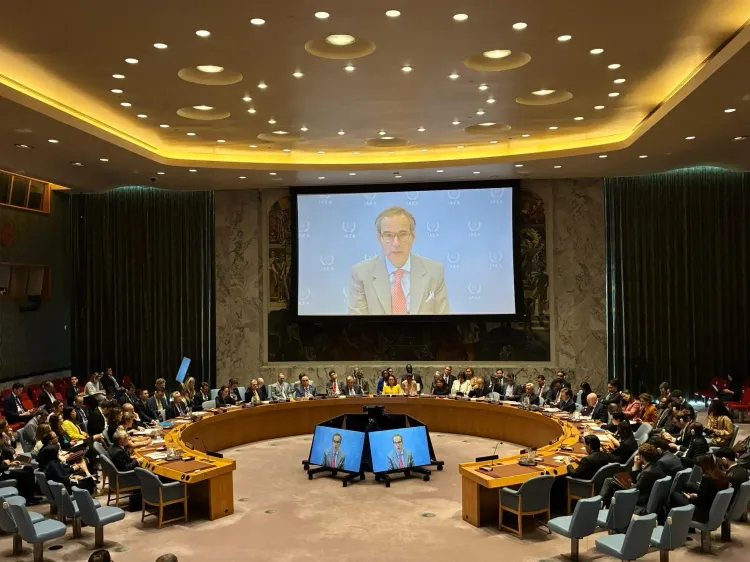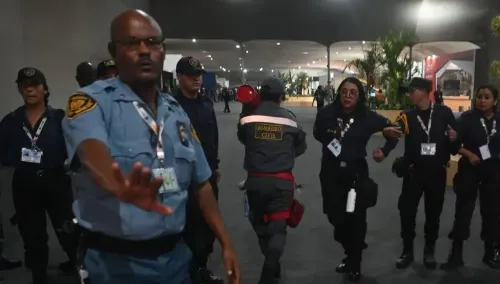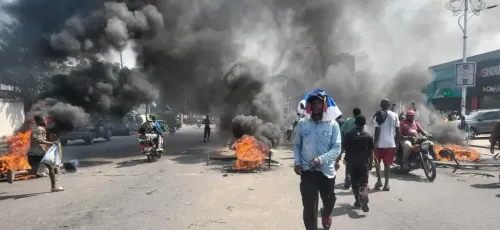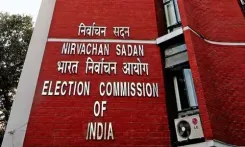What Risks Are Posed by Nuclear Fallout from Israeli Attacks on Iran?

Synopsis
Key Takeaways
- The IAEA warns of potential nuclear contamination from Israeli attacks on Iranian facilities.
- Attacks have severely compromised nuclear safety in Iran.
- No radiological release has occurred yet, but the risk remains.
- Diplomatic solutions are critical to preventing a nuclear crisis.
- Military escalation could lead to catastrophic consequences.
United Nations, June 21 (NationPress) Rafael Grossi, the Director General of the International Atomic Energy Agency (IAEA), has raised alarms regarding the potential for nuclear contamination resulting from Israeli strikes on Iranian nuclear facilities. According to Grossi, these attacks have significantly undermined nuclear safety and security within Iran. While no radiological release has impacted the public thus far, the possibility remains a serious concern.
During his presentation at a critical Security Council meeting, Grossi noted that even though radiation levels outside the Natanz site have remained stable and within normal limits, there are signs of both radiological and chemical contamination inside the complex, as reported by the Xinhua news agency.
"The radiation primarily comprises alpha particles, which could pose a serious threat if inhaled or ingested. This risk can be mitigated through appropriate safety measures, such as respiratory equipment. However, the predominant concern within the facility revolves around chemical toxicity," he stated.
Grossi highlighted that Fordow, Iran's primary uranium enrichment site, currently shows no signs of damage. Meanwhile, the Esfahan nuclear site experienced damage to four buildings during a June 13 attack, although no increase in off-site radiation levels has been detected. As with Natanz, the primary issue remains chemical toxicity.
Grossi cautioned that an attack on the Bushehr Nuclear Power Plant, which operates with significant amounts of nuclear material, could have dire repercussions. "Let me be perfectly clear: an attack on Bushehr could lead to a substantial release of radioactivity into the environment," he warned.
He emphasized that disabling the power supply lines to the plant could result in a reactor core meltdown, leading to a high release of radioactivity. Such scenarios would necessitate emergency measures, including evacuations and sheltering, potentially affecting areas spanning several hundred kilometers.
Monitoring radiation would need to extend far beyond the immediate vicinity, and food restrictions might become necessary, he cautioned.
Furthermore, any action against the Tehran Nuclear Research Reactor could have catastrophic consequences for the city's populace.
Grossi stressed the absolute necessity of avoiding armed attacks on nuclear facilities and called for utmost restraint. He underlined that military escalation jeopardizes lives and hinders essential diplomatic efforts aimed at ensuring Iran does not develop nuclear weapons.
"A diplomatic resolution is attainable if the political will is present. The IAEA can ensure, through rigorous inspection protocols, that Iran will not pursue nuclear weapons, forming the foundation of a lasting agreement that promotes peace and averts a nuclear crisis in the Middle East," Grossi stated. "This opportunity should not be squandered."
He further warned that the alternative could lead to prolonged conflict and a growing threat of nuclear proliferation, which would undermine the Non-Proliferation Treaty and the broader non-proliferation framework.









